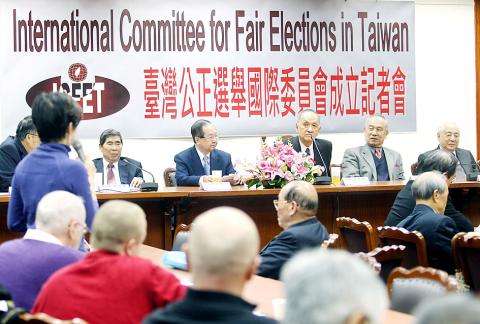More than 80 international and domestic politicians, academics and democracy advocates launched a coalition yesterday calling for free and fair elections and a peaceful transition of power.
The International Committee for Fair Elections in Taiwan (ICFET) announced its formal establishment in Taipei 30 days before the Jan. 14 presidential and legislative elections.
“We have only one sincere but strong demand — that the Jan. 14 elections should be conducted fairly and properly, as fair elections are the minimum requirement for a democratic society and the polls come as a great challenge for Taiwan,” said former presidential adviser Peng Ming-min (彭明敏), chairman of the organization.

Photo: CNA
Among the international members are 12 members of the Japanese Diet, five members of the European Parliament, civil society leaders from all continents and experts on Taiwan and Asian affairs, as well as a distinguished group of Taiwanese elder statesmen.
The committee will be closely monitoring election developments and would expose anything inappropriate and unfair, Peng said, adding that it would organize a program to observe the elections from Jan. 11 to Jan. 16, which would include visits to party headquarters, presidential campaign offices, election rallies and election briefings.
The committee called on all Taiwan’s political players to abide by the principles of a fair election and to refrain from violent behavior, while asking the international community to respect the political choices of the people of Taiwan.
On behalf of the international members of the committee, Stephane Corcuff, a professor at France’s University of Lyon, said while free elections had been the norm in Taiwan for decades, fairness and impartiality must be ensured.
“Freedom and justice should always go hand in hand in elections. Free and just elections serve everyone’s interests,” Corcuff said.
The committee intends to play an important role in the four-month transitional period between Jan. 14 and May 20, the longest transition period in the history of Taiwan’s elections, former deputy foreign minister Michael Kao (高英茂) said.
The committee had planned to invite former US president Jimmy Carter to act as an observer of the elections, but the plan failed to materialize because Carter insisted on a joint invitation by all three presidential candidates and President Ma Ying-jeou (馬英九), who is seeking re-election, refused to sign up, said Chai Trong-rong (蔡同榮), committee executive officer and a legislator of the Democratic Progressive Party.
Former president Lee Teng-hui (李登輝) serves as the committee’s honorary chairman, while Wu Li-pei (吳澧培), founding chairman of the Formosa Foundation, and Wu Rong-i (吳榮義), chairman of the Taiwan Brain Trust think tank, serve as vice chairmen.
Notable international members include Edward McMillan-Scott, who is vice president of the European Parliament, Graham Watson, who is president of the European Liberal Democrat and Reform Party and Nat Bellcchi, former chairman of the American Institute in Taipei, among others.

DAREDEVIL: Honnold said it had always been a dream of his to climb Taipei 101, while a Netflix producer said the skyscraper was ‘a real icon of this country’ US climber Alex Honnold yesterday took on Taiwan’s tallest building, becoming the first person to scale Taipei 101 without a rope, harness or safety net. Hundreds of spectators gathered at the base of the 101-story skyscraper to watch Honnold, 40, embark on his daredevil feat, which was also broadcast live on Netflix. Dressed in a red T-shirt and yellow custom-made climbing shoes, Honnold swiftly moved up the southeast face of the glass and steel building. At one point, he stepped onto a platform midway up to wave down at fans and onlookers who were taking photos. People watching from inside

A Vietnamese migrant worker yesterday won NT$12 million (US$379,627) on a Lunar New Year scratch card in Kaohsiung as part of Taiwan Lottery Co’s (台灣彩券) “NT$12 Million Grand Fortune” (1200萬大吉利) game. The man was the first top-prize winner of the new game launched on Jan. 6 to mark the Lunar New Year. Three Vietnamese migrant workers visited a Taiwan Lottery shop on Xinyue Street in Kaohsiung’s Gangshan District (崗山), a store representative said. The player bought multiple tickets and, after winning nothing, held the final lottery ticket in one hand and rubbed the store’s statue of the Maitreya Buddha’s belly with the other,

Japan’s strategic alliance with the US would collapse if Tokyo were to turn away from a conflict in Taiwan, Japanese Prime Minister Sanae Takaichi said yesterday, but distanced herself from previous comments that suggested a possible military response in such an event. Takaichi expressed her latest views on a nationally broadcast TV program late on Monday, where an opposition party leader criticized her for igniting tensions with China with the earlier remarks. Ties between Japan and China have sunk to the worst level in years after Takaichi said in November that a hypothetical Chinese attack on Taiwan could bring about a Japanese

‘COMMITTED TO DETERRENCE’: Washington would stand by its allies, but it can only help as much as countries help themselves, Raymond Greene said The US is committed to deterrence in the first island chain, but it should not bear the burden alone, as “freedom is not free,” American Institute in Taiwan Director Raymond Greene said in a speech at the Institute for National Defense and Security Research’s “Strengthening Resilience: Defense as the Engine of Development” seminar in Taipei yesterday. In the speech, titled “Investing Together and a Secure and Prosperous Future,” Greene highlighted the contributions of US President Donald Trump’s administration to Taiwan’s defense efforts, including the establishment of supply chains for drones and autonomous systems, offers of security assistance and the expansion of